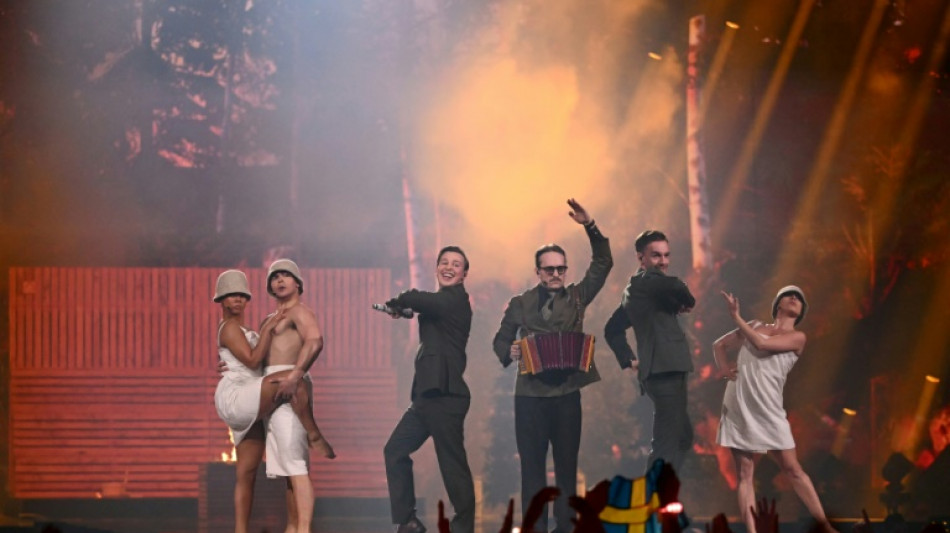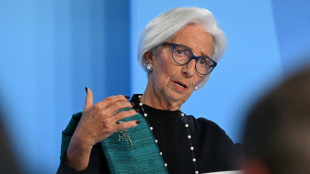

Eurovision favourite KAJ shines spotlight on Finland's Swedish- speaking minority
Comedy act KAJ, the favourite to win Saturday's Eurovision Song Contest for Sweden, has shone a spotlight on Finland's small Swedish-speaking minority, little-known outside the Nordic region, Finnish officials say.
The three-man group has soared out of obscurity with its song "Bara Bada Bastu", a kitsch and quirky number about going to the sauna sung in Swedish, Finnish and a local Swedish dialect spoken only in the trio's hometown of Vora in western Finland.
"The whole of Europe knows about this minority in Finland in a completely different way than before," Jan Finne, the municipal director of Vora, told AFP.
Kevin Holmstrom, Axel Ahman and Jakob Norrgard -- whose first initials spell KAJ -- met as children growing up in Vora, a predominantly Swedish-speaking town of 6,300 inhabitants.
KAJ was virtually unknown in Sweden when it entered that country's Melodifestivalen contest to select its Eurovision contestant -- ultimately winning by a landslide.
"It's amazing that the Swedish people wanted us to represent them," Norrgard told AFP in an interview.
"It feels like we're going out in Europe to represent the brotherhood between Sweden and Finland," he said.
In Finland, both Finnish and Swedish are official languages and roughly five percent of its 5.5 million population speak Swedish as their mother tongue.
Most of the country's municipalities with bilingual or predominantly Swedish-speaking populations are located in Finland's western and southern coastal regions.
"In Vora, actually four out of five speak Swedish as their native language," Finne told AFP.
Finland's bilingualism traces its roots back to the country's common history with Sweden.
It was part of Sweden until 1809 when it became a Russian grand duchy, before declaring independence in 1917.
The Swedish-speaking population view themselves as Finnish people but who have Swedish as their mother tongue.
Both Finnish and Swedish speakers have an equal right to social and cultural services such as education and healthcare in their own language, according to the country's constitution.
- 'Strengthening understanding' -
Ahead of Saturday's Eurovision finals in Basel, Switzerland, Vora has gone KAJ crazy.
Banners and posters plastered around the town trumpet support for the trio in the special Swedish dialect spoken in the area, called "Voorospraatji".
Local artisan shops display handmade wool socks, sweaters and sauna hats emblazoned with "KAJ".
Eva-Stina Krooks, 79, who runs one of the handicraft stores, said KAJ's breakthrough had brought an unprecedented flow of curious visitors to the municipality, including Finland's President Alexander Stubb in late April.
"Everyone knows where Vora is nowadays and the local dialect has gone global," she said.
As a Swedish-speaking Finn in Vora, Krooks said she rarely uses Finnish in her daily life, and said it was "great for us to see that Sweden now knows we exist".
MP Henrik Wickstrom, the chair of the Swedish Assembly of Finland -- a statutory organisation safeguarding the cultural and linguistic rights of Swedish-speaking Finns -- said KAJ's participation in Eurovision "had done much for the Swedish language in Finland by strengthening understanding".
Finne said Saturday's final would be celebrated with "a big party" in Vora.
"We have over 1,000 people coming here and celebrating KAJ," he said, standing outside the high school where the event would be held -- and where KAJ held their first-ever performance in 2009.
Finns will also be cheering for Finland's representative Erika Vikman, competing with the song "Ich Komme".
Teacher Katja Grannas said she was nervous to see her former students take to the stage in Basel as KAJ.
"I don't know if I can even watch the show, I will be so excited," she said, laughing.
This year's Eurovision will feature 20 different languages, the highest number since 1999, according to the European Broadcasting Union.
X.Saavedra--GBA



